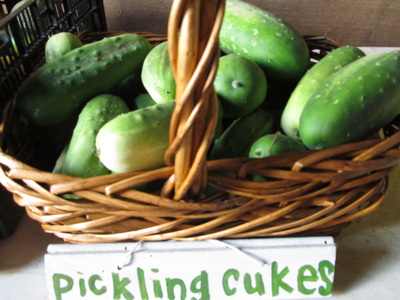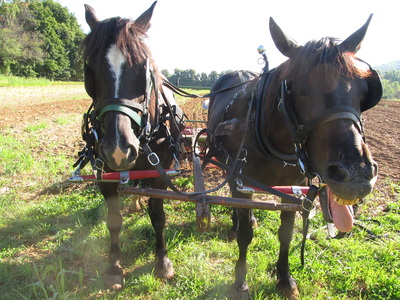|
"Sometimes I was grateful because I knew I ought to be, sometimes because I wanted to be, and sometimes a sweet thankfulness came to me on its own, like a singing from somewhere out in the dark."
-from Wendell Berry's Hannah Coulter Dear Friends and Family, A few scattered field notes from our life here at Good Work... A lot of people have been talking to me about food being "wasted" lately--about not wanting to let food "go to waste"--a respectable urge. As the saying goes, "waste not, want not," and, if your childhood was anything like mine, I can understand where this sentiment comes from. I came from a household where uneaten dinners were saved in seran wrap in the fridge until bellies decided they were hungry again, where we had to coax and plead with our father not to eat the forgotten-about pumpkin pie topped with a bright green fur a few weeks after Thanksgiving, but to instead throw it away. I value this frugality, for sure. I am not one to opt for wastefullness. But on a farm, things operate under different perameters. It took me about 6 years of farming to let go of the concept of "wasting food." When I first started farming, I spent my every-waking hour trying to freeze, can, and dehydrate any green tomato or half-cabbage-moth-eaten piece of Kale in the field. Over time, I realized personal sanity is more important than saving compost from being composted, and I let go of some instincts and obsessions. Although I am the first to try and donate any possible excess food we have to those families in our community who might need this offering, and I believe preserving the harvest for winter is not only empowering, it is also necessary, I have learned to appreciate the value of letting the unwanted, uneaten, and unsalvageable produce decompose, as it surely aught, as I hope that I, too, get to do one day some time away from now. In a spiritual sense, I am not sure if the value of my own life is any greater or lesser than that of the soil microbes, worms, and fungi, and so, I am just as happy to feed them as I am to feed myself, and in fact all we are really doing is feeding one another--those microbes and I. In this system, in an ideal system, there is no waste. It is not a concept which can exist, for where did the food come from--out of the sun, rain, air, and earth itself, and so, is it wasteful to return these plant materials, just leaves and fruits and roots, back to from where they came? I would encourage you to think it is not. -- Though some people might still be cringing when they remember last winter, I am happy to welcome the coming of fall, the pendulum swinging back to a quietness and slowness, the momentum of summer bringing us to its natural conclusion. In a sense, fall might come a little earlier to us farm folk; I calibrate fall not by the weather patterns or the scent of the air or the color of the trees, but by when I need to seed and plant which crops in order to get them to a harvestable stage before the cold nights and short days come to a head. A few weeks ago, looking at the crop plan, autumn become fast upon us. Seed packets generally list the "days to maturity" of each crop, denoting how many days of warmth and light are needed to carry the plant from seed to crop. Parsnips, at 120 days, are one of the longest DTM crops we grow (we seeded those back in April), while radishes and salad turnips are some of the shortest, at around 25-30 days (and will go in the ground this week)--though both might show-up in your CSA share around the same time this fall. Last week marked the last of the greenhouse seeding for the year--all of the head lettuces for the remainder of the season will have to do their growing now, and then will quite happily hold in the field during the cooler months of October and early November, awaiting harvest. -- We practice Food Justice at Good Work in part by connecting with local food banks with whom we are able to share our abundance--I do not write this to toot our own horn, but rather to express the extension of our work into the community beyond our CSA, which is only possible because of the financial commitments of our CSA families. Sure, driving to the food bank on a Saturday morning, I might be inclined to believe I am doing good work, but, in moments of peace, which is to say, in moments of truth, I become accutely aware that I am not the one donating these vegetables, we are merely the messengers--with a whole community behind us enabling us to do this work, and serve needs around us. Justfood.org defines Food Justice as, "communities exercising their right to grow, sell, and eat healthy food. Healthy food is fresh, nutritious, affordable, culturally-appropriate, and grown locally with care for the well-being of the land, workers, and animals. People practicing food justice leads to a strong local food system, self-reliant communities, and a healthy environment." Though we have a long way to go, this year we have connected with two local pantries--in Zionsville and Coopersburg, where we are forming, we hope, strong connections that will allow us to access a population of our community who may not have the financial means, transportation, appetite, or interest to connect with us through CSA just yet. In our planting calendar this month, the virtue of the month is outlined as: Compassion leads to Freedom. When I can remember, I use these words as a sort of mediation, a backdrop against which to reflect and consider my actions and my thoughts--naturally when I am without compassion, it is my own freedom which is at stake, and there is a beautiful surrender and a heavy humor in this. It is only through Compassion--for Self and Others, for horses and dog--that I am without the futility of frustration and anger, and am instead free. -- And so, we thank you for farming with us, and eating with us, and allowing us to be generous when we are able, Lisa and Anton
1 Comment
|
Archives
December 2019
FarmersAnton M. Shannon Categories
All
|



 RSS Feed
RSS Feed